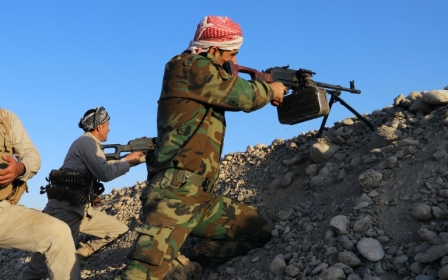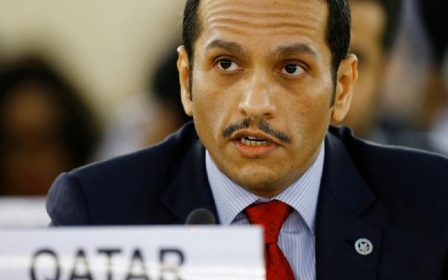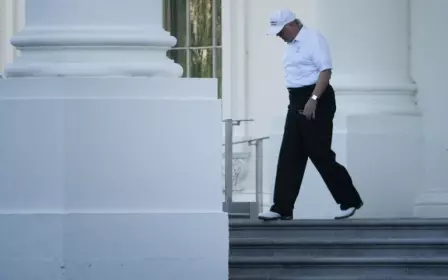Steve Bannon says Trump's Saudi visit started Qatar crisis
Former White House chief strategist Steve Bannon on Monday credited US President Donald Trump’s visit to Saudi Arabia for the blockade against Qatar and changes within the kingdom itself.
Speaking at a conference titled, “Countering Violent Extremism: Qatar, Iran, and the Muslim Brotherhood” hosted by the Hudson Institute, a conservative think tank, Bannon said Trump’s summit with Arab leaders in Riyadh in May set in motion the regional escalation against Qatar.
On 5 June, Saudi Arabia, the United Arab Emirates and Egypt announced a boycott against Qatar, accusing it of supporting militant groups and garnering ties with Iran, charges that Doha denies.
“We went into the summit with UAE, Saudi Arabia and others; the number one thing was that we must take care of this financing of radical Islam, and there can be no more - as President Trump said - no more games,” Bannon said.
“You can’t have it both ways. You can’t on one side say you’re a friend and an ally and on the other side be financing the Muslim Brotherhood or Hamas,” he added, in an apparent reference to Qatar.
Bannon said Trump’s visit to Riyadh demonstrated that the US president is willing to engage with the Muslim world, proving that he and his aides are not Islamophobic.
“I don’t think it’s just by happenstance that two weeks after that summit, you saw the blockade by the United Arab Emirates and Bahrain, Egypt and the kingdom of Saudi Arabia on Qatar,” Bannon said.
The situation in Qatar, he added, is “the single most important thing that’s going on right now in the world”.
Beyond being the catalyst for the blockade, Bannon said the summit in May sparked changes within Saudi Arabia, including the promotion of Mohammed bin Salman to crown prince.
“Two weeks ago or three weeks ago there were a thousand clerics that were rounded up or somehow put under house arrest,” Bannon said.
Earlier this month, Saudi Arabia ordered the arrest of 20 prominent religious scholars, including Salman al-Odah, one of the most liberal voices within the Saudi religious establishment.
The Trump administration has sent conflicting messages about the Gulf crisis. After Saudi Arabia and its allies announced the boycott against Qatar in June, the US president sent a tweet supporting the blockade.
Trump later accused Doha of supporting terrorism "at a very high level". Trump's accusations came as the Pentagon and US secretary of state cautioned against the siege and praised Qatar’s role in the region.
Qatar is home to the region’s biggest US military base. In July, Washington and Doha signed an agreement to combat terrorism financing.
Qatar’s foreign minister warned last week that the blockade is harming global efforts against the Islamic State (IS) group.
Bannon said on Monday that elements of the foreign policy “establishment” have taken a favourable stance toward Qatar against American interests.
The former chief strategist, who was forced out of the White House in August, has been a close adviser of Trump and is said to be responsible for key policies, including the “Muslim ban.”
Bannon, who describes himself as a “populist,” has been accused of white supremacy and anti-Semitism. His website Breitbart is popular among far-right conservatives. He has been called a "well-known white supremacist leader" by the National Association for the Advancement of Colored People (NAACP).
Bannon accused Qatar of paying think tanks to polish its image in the United States. However, as a part of its effort against Qatar, the UAE has hired the parent company of a public relations firm that spread internet ads which helped Trump get elected.
When pressed about his ties to the firm on Monday, Bannon said he has nothing to do with it.
Republican Senator Tom Cotton said at the conference that US policy should be focused on separating Qatar from Iran and the Muslim Brotherhood to bring Doha “back to the fold” as a strategic US ally.
Cotton, who has led hawkish opposition to the Iran nuclear deal since it was signed under President Barack Obama in 2015, portrayed Iran as the source of all instability in the Middle East.
New MEE newsletter: Jerusalem Dispatch
Sign up to get the latest insights and analysis on Israel-Palestine, alongside Turkey Unpacked and other MEE newsletters
Middle East Eye delivers independent and unrivalled coverage and analysis of the Middle East, North Africa and beyond. To learn more about republishing this content and the associated fees, please fill out this form. More about MEE can be found here.




